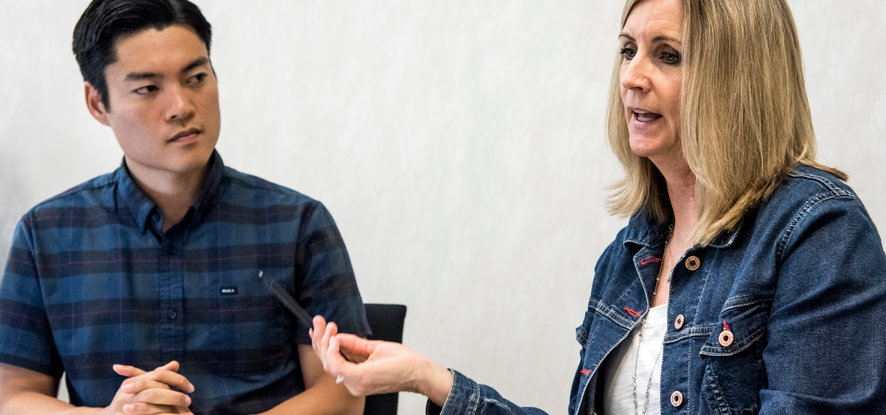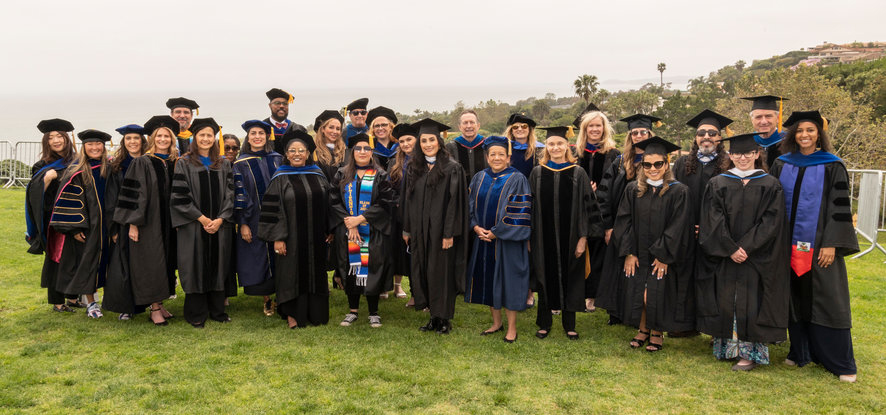What Is MFT?

MFT stands for Marriage and Family Therapy, a branch of clinical psychology that focuses on family dynamics and relationships. Licensed Marriage and Family Therapists (LMFTs) are mental health practitioners who help individuals, couples, and family members overcome a wide variety of mental health issues.
In order to become a LMFT, you must meet certain educational requirements, including completing a master's degree program from an accredited university. You must also complete required supervision hours and pass the licensing exam in order to practice in your chosen state. Once you've met all the requirements, you can start providing individual therapy, couples therapy or group therapy for the entire family.
Read on for more information about the type of work family therapists do, where they work, and how you can become a licensed MFT and start offering mental health counseling services.
What Do MFTs Do?
When you think of an MFT, couples therapy or marriage counseling is probably the first thing that comes to mind. But marriage and family therapists treat a variety of issues in the mental health profession, offering counseling services to anyone who needs help navigating family dynamics, relationships, parenting, or other issues related to family systems.
Common Issues They Treat
Marital Problems: MFTs help couples navigate all kinds of issues, from infidelity and trust issues to communication breakdowns. And they don't just work with couples in a traditional marriage; they may work on these issues with couples in all different types of relationships, including cohabitation relationships, long-distance relationships, polyamory, open relationships, and more.
Parent/Child Conflicts and Parenting Issues: Parenting issues are another common topic within the field of marriage and family therapy. Therapists may help new parents work through the adjustment to parenthood, balancing family and career, managing postpartum depression, or navigating the complexities of adoptive or blended families.
Behavioral Problems in Children and Teens: MFTs address behavioral issues such as defiance, school-related problems, or social struggles. They work not just with the child, but also with the entire family, to understand underlying issues and develop strategies for change. This can include managing ADHD, handling peer pressure, or addressing the impacts of bullying.
Communication Problems: MFTs focus on enhancing effective communication within relationships and families. They teach techniques for active listening, expressing feelings constructively, and resolving conflicts. The goal is to provide an environment where each member feels heard and understood.
Sexual Orientation: MFTs assist individuals and families in navigating issues related to sexual orientation. This includes support for coming out, dealing with societal or familial acceptance, and addressing the unique challenges faced by LGBTQIA+ individuals and their families.
Sexual Dysfunction: Therapists in this field may also be licensed sex therapists, who help couples and individuals address issues of sexual dysfunction. This may involve exploring psychological factors, fostering communication about sexual needs and preferences, and developing a healthy and satisfying intimate relationship.
Financial Difficulties: Financial stress can significantly impact relationships and family dynamics. MFTs provide support and strategies for managing financial stress, improving communication around topics related to money, and aligning financial goals and practices within the family.
Emotional Disorders: Marriage and family therapists address a range of emotional disorders, including anxiety, depression, and mood disorders, understanding how these issues affect not just the individual but their relationships as well.
Major Life Transitions: MFTs support individuals and families through transitions like career changes, moving, retirement, or the addition of a new family member. They provide strategies to cope with change, adjust roles within the family, and maintain healthy relationships through these shifts.
Elder Care: Therapists may also assist families in addressing the challenges associated with caring for aging relatives. This includes navigating caregiver stress, making decisions about elder care, and managing family dynamics affected by the aging process.
Death of a Loved One: MFTs provide crucial support in times of grief, helping individuals and families process loss, work through grief, and adapt to life after the death of a loved one.
Alcoholism and Substance Abuse: Therapists work with individuals and their families affected by alcoholism and substance abuse. They help in understanding the impact of addiction on family dynamics and provide support for recovery and rebuilding relationships.
Domestic Violence: In cases of domestic violence, MFTs offer a safe space for victims to express themselves, understand the dynamics of abuse, and develop a plan for safety and recovery. They also work with families to break the cycle of violence and foster healthier relationships.
Other Trauma: MFTs are skilled in dealing with the aftermath of traumatic experiences, whether it’s a personal tragedy, an accident, or a natural disaster. They offer strategies for coping with trauma, processing emotional responses, and rebuilding a sense of normalcy.
Who They Serve
Marriage and Family Therapists cater to a wide range of clients, embracing the complexity and uniqueness of each family unit. They work with individuals who are struggling with personal challenges, helping them to understand how these issues are influenced by and impact their family dynamics.
Couples, whether married or in other forms of partnerships, can work with MFTs to navigate relationship challenges, from communication breakdowns to more severe conflicts. Families also benefit from group therapy programs.
MFTs assist in resolving conflicts, improving relationships, and fostering a healthier, more supportive family environment. The emphasis is always on understanding the individual in the context of their relationships and recognizing the connected nature of the family unit.
Where They Work
MFTs can work in a variety of settings.
- Many work in private practices, offering personalized therapy sessions tailored to the unique needs of individuals, couples, and families.
- Hospitals and healthcare settings utilize MFTs to provide support to patients and their families, particularly in cases where illness or injury affects family dynamics.
- Educational institutions like schools and universities often have MFTs to assist students with challenges related to their family life or relationships.
- Social service agencies also benefit from the expertise of MFTs, as they work with diverse families facing various social, economic, and emotional challenges.
In each of these settings, MFTs apply their specialized knowledge of family systems to promote mental and emotional well-being.
How to Become an MFT
To become a Marriage and Family Therapist, you must meet certain education requirements and licensing requirements. You'll need a bachelor's degree in psychology or a closely related field and a master's degree, specifically within a marriage and family therapy program. Some LMFTs also pursue a doctoral degree as they move forward in their profession.
To meet the requirements for licensure, candidates must also complete direct client contact hours through supervised clinical placements. These requirements vary by state, but they are essential in preparing candidates for the realities of MFT practice.
MFT Degree Requirements
The MA in Clinical Psychology With an Emphasis in Marriage and Family Therapy degree program at Pepperdine University provides a blend of theoretical learning and practical application, giving students both a strong foundation in theory as well as the opportunity to use their newfound knowledge and evaluation tools in real-world settings.
The program equips students with knowledge of various models of therapy, grounding them in both traditional and contemporary approaches to family therapy and couple therapy. The coursework also emphasizes the importance of understanding and addressing issues within the family unit, such as communication breakdowns, parenting challenges, and marital conflicts.
What You’ll Learn in an MFT Program

The MFT program at Pepperdine University is a 2-year program that prepares full-time students to sit for the LMFT or LPCC licensure exams in the state of California. This rigorous program is designed to provide a comprehensive understanding of the different aspects of family therapy.
Understanding and Treating Mental Health Disorders
One of the most important parts of an MFT degree program is an in-depth exploration of mental health disorders. Students learn to diagnose and treat a range of conditions using the DSM system, focusing on evidence-based interventions, which is crucial in the profession of marriage and family therapy.
This includes a thorough examination of different treatment modalities like individual, group, and systemic therapies, ensuring that students become experts at addressing mental health concerns with a variety of approaches.
Assessment Techniques
Another important part of the program is developing diagnostic skills to assess individuals, couples, and families. Students learn to apply psychological instruments effectively, understanding both standardized and non-standardized testing methods. Ethical and cultural diversity in assessment are also emphasized, equipping students to conduct evaluations sensitively and with cultural humility.
Group Therapy and Interpersonal Skills
Students also learn about the dynamics of group therapy. They explore various therapeutic formats for family development, personal development, enhancing relationships, gaining hands-on experience in group settings. This aspect of an MFT master's program is important for developing strong interpersonal skills.
Theoretical Foundations of Therapy
A strong understanding of systems-based theories of therapy is also essential. The curriculum covers major theoretical approaches, highlighting their assumptions, methods, and cross-cultural applications. Students will also begin to develop their own personal theories of therapy and the application of theory to client situations.
Multicultural and Ethical Considerations
In today's diverse society, multicultural competence is a must. The program addresses factors like race, ethnicity, socioeconomic status, and sexual orientation, and their impact on therapy processes. Professional ethics and legal issues specific to mental health professionals are also a significant part of the curriculum, ensuring students are well-versed in the ethical practice of therapy.
Specialized Areas of Treatment
M Master's in MFT offers courses focusing on specific areas such as substance abuse treatment, where students learn about recovery-oriented approaches and treatment of co-occurring disorders. Human sexuality and intimacy are also explored, understanding the complexities associated with sexual identity and behavior within relationships.
Research Methods and Psychopharmacology
To be effective in the practice of marriage and family therapy, students must also understand research methods and the role of medications in treatment. You'll learn about statistics, research design, and evaluation methods, making students knowledgeable consumers of research. The study of psychopharmacology is incorporated to provide insights into the use of medication in treating mental disorders.
Professional Development and Advocacy
The course also prepares students for the professional world of mental health. It explores various practice opportunities and modalities, helps students navigate the licensing process, and emphasizes the importance of community involvement and advocacy.
Life Cycle and Developmental Perspectives
Understanding the life span development of individuals and families is crucial. Coursework examines the biological, psychological, and socio-emotional development stages and their impact on the family unit. It also addresses how life events like marriage, divorce, and aging affect individuals and families, considering cultural and contextual factors.
Working with Children and Adolescents
Special attention is given to therapeutic methods for treating children and adolescents. This includes understanding legal and ethical concerns, assessment strategies, and treatment approaches for common childhood psychopathology, always considering the family and contextual factors.
Addressing Trauma in Diverse Populations
Finally, a graduate degree in MFT addresses trauma psychology, with a focus on multicultural competence and trauma intervention. This includes understanding and treating various forms of interpersonal trauma, as well as trauma resulting from natural disasters and medical events.
Supervised Clinical Experience
Supervised clinical experience is a required part of an MFT degree program. At Pepperdine University, students engage in direct client contact hours under the supervision of licensed professionals. This hands-on experience is vital for developing practical skills in conducting therapy sessions, assessing client needs, and applying therapeutic techniques in real-world scenarios. These clinical hours are not only a key part of the degree requirements but also essential for meeting the clinical training requirements for licensure.
LMFT Exam
Upon completing their degree in marriage and family therapy and fulfilling the necessary clinical hours, graduates are required to pass the Licensed Marriage and Family Therapist (LMFT) exam. This exam assesses the candidate’s knowledge and skills, ensuring they are adequately prepared for independent practice.
Passing the LMFT exam is the final step in the journey to becoming a licensed MFT, allowing graduates to practice mental health counseling within the specialized context of marriage and family therapy.
Is an MFT Degree Worth It?

An MFT degree not only provides the opportunity for a rewarding career in terms of both personal fulfillment and salary expectations but also opens up a number of professional opportunities.
Graduates can explore careers in mental health counseling, social services, and even establish their private practices. The skills acquired through an MFT program, such as understanding complex family structures and addressing various concerns in marriage and family dynamics, are highly valued in today's society where the emphasis on mental health and well-being is ever-increasing.
For prospective students seeking a career that makes a significant impact on individuals, couples, and families, an MFT degree is an excellent choice.
Why Choose Pepperdine University For Your MFT Degree?
Pepperdine University is a top choice for prospective students considering an MFT degree. The program is regionally accredited and consistently listed as a top choice for graduate clinical psychology programs by the National Center for Education Statistics, assuring a quality education that meets high standards.
The experienced faculty are not only educators but also practicing professionals who bring real-world insights into the classroom. The comprehensive curriculum covers a wide range of therapy courses, equipping students with knowledge and essential skills relevant to current trends and practices in family therapy.
The program's cohort model provides a collaborative learning environment, allowing students to grow alongside peers who share similar professional aspirations. The clinical training hours included in the program are designed to meet licensure requirements, ensuring that students are well-prepared for the realities of professional practice.
For more information on application deadlines, admissions requirements, and financial aid, attend an info session or request more information online.